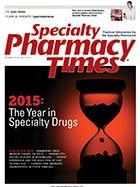Publication
Article
Specialty Pharmacy Times
A “Black Eye†in Specialty: Educating the Media
Stakeholders must work together to combat media reports that incorrectly define specialty pharmacy by the cost of medications and not the services provided.
THERE HAVE BEEN A NUMBER of news reports over the last several weeks calling into question the integrity of the business and practice of specialty pharmacy. Pharmacy is practiced in several different settings, each of which offers a unique set of services.
Please consider using our editorial this month as a primer for educating the media, because we have a lot of clean-up work to do for all the wrong reasons. Specialty Pharmacy Times is working closely with the National Association of Specialty Pharmacy to educate the market place, and each of us has to do our part.
What Makes Specialty Pharmacy Different?
Pharmacists working in any pharmacy involved with dispensing drugs and providing services to patients must also be registered by the board of pharmacy. A registered pharmacist receives 6 years of university training (Doctor of Pharmacy), 6 or more months of hands-on training, and must pass a rigorous state licensing exam in order to become registered (RPh).
All pharmacies MUST be licensed by their respective state board of pharmacy. The board of pharmacy will designate, depending on practice setting, which license a pharmacy must obtain.
These licenses include community or retail pharmacy, mail order, hospital, and long-term care, just to name a few. To date, no state has officially designated a category for specialty pharmacy.
Thus, some pharmacies are licensed as retail or mail order, while others are often determined by the method and setting in which the business operates. The fact that there is no regulated definition of specialty pharmacy has led to rampant confusion as to what a true purposed specialty pharmacy is.
To assist in better defining a specialty pharmacy, in addition to being state-licensed and regulated, specialty pharmacies are often accredited by independent third parties, such as URAC, or the Accreditation Commission for Health Care. Most entities claiming to be a specialty pharmacy demonstrate competency by obtaining accreditation.
The primary goal for specialty pharmacies is to focus its practice on therapy for patients with serious health conditions that include cancer, hepatitis, rheumatoid arthritis, HIV/AIDS, multiple sclerosis, organ transplantation, or bleeding disorders.
Most high-cost complex medications are currently limited to accredited specialty pharmacies that provide a core set of services to a level that is not generally available via corner drug store or mail order pharmacy.
Among these services is providing assistance with reimbursement for costly treatments that have limited availability. Specialty medications frequently require special handling and administration assistance.
Furthermore, intensive patient management is often needed, which includes instructing patients on how to inject themselves while providing general awareness regarding the effective use of these medications.
Frequently, the more complex administration of these products may require a specialty pharmacy to dispense the product and send it to the doctor or hospital where patients are injected or infused.
Specialty pharmacies provide a variety of services, both in-person and over the phone, regarding proper medication utilization, comprehensive treatment assessment, patient monitoring, and frequent communication with caregivers, physicians, and other health care providers.
Specialty medications are frequently defined by the Centers for Medicare & Medicaid Services as costing in excess of $600 per month, however these therapies are often exponentially greater in cost. These high-cost drugs may present financial challenges to patients and their doctors, therefore specialty pharmacies can provide assistance in arranging for payment by private insurance, Medicare, or Medicaid.
With the growth of specialty products, private health insurance organizations often put cost and therapeutic controls in place that specialty pharmacies help navigate. When a product cannot be paid for in a traditional manner, specialty pharmacy often facilitates financial assistance from patient support organizations.
Pharmaceutical manufacturers often contract with a limited number of specialty pharmacies to support distribution and enhanced services for products. As pharmacies are professional entities, these services must be governed by a strict set of principles and guidelines through rigorous service agreements.
This controlled distribution environment ensures that patients receive a high standard of consistent care designed to maximize the efficacy of these important therapies.
Alternative Customized Non-Specialty Services
Unlike specialty pharmacy, mail order pharmacies have been around for decades. Newer to the scene are direct-to-patient dispensing pharmacies that share more characteristics with mail order pharmacies than specialty. Direct-to-patient pharmacies can be coupled with customized manufacturer programs designed to offer patients services focused on specific products.
These are generally NOT specialty products, but instead are products that may carry a higher cost, have a less favorable profile with insurance companies with higher copays, be coming off of patent, or just offer a lower cost to the manufacturer other than selling to wholesale distributors.
Pharmacies offering these services should be licensed in every state where they distribute products and have obtained accreditation from the National Association of Boards of Pharmacy’s Verified Internet Pharmacy Practice Sites program.
Mail order pharmacies primarily came to the forefront when prescription benefit managers decided that sending 90-day supplies directly to a patient’s home for chronic use medications was more cost effective than the corner drug store.
Know the Difference
There is a distinct difference between specialty, mail order, and direct-to-patient pharmacies. Specialty pharmacy is very service oriented, while the others are generally high volume and not customized to meet patient needs.
The rules of engagement are frequently quite different, as there is often confusion regarding semantics and definitions that can overlap. The Academy of Managed Care Pharmacy (AMCP) defines specialty pharmaceuticals and pharmacy as, “Requiring a difficult or unusual process of delivery to the patient (preparation, handling, storage, inventory, distribution, Risk Evaluation and Mitigation Strategy [REMS] programs, data collection, or administration) or, patient management prior to or following administration (monitoring, disease or therapeutic support systems).”
In addition, the AMCP continues by stating “High cost is not enough to define a product as a specialty pharmaceutical, as this definition alone would potentially capture an expensive branded drug with no other special needs for delivery or patient management.”
AMCP also noted that specialty pharmacies are distinct from traditional pharmacies through the coordination of patient care and disease management. In addition to managing special handling, storage, and distribution requirements with specialty drugs, specialty pharmacies also seek to to improve clinical and economic outcomes in the treatment of complex, sometimes chronic and rare diseases, while maintaining close contact with and management by clinicians.
It is well accepted that specialty products generally require a great deal of more professional intervention than “lick, stick, and pour” and mail out the door. The specialty pharmacy business is built around improving patient lives and can have an incredible impact on their health.
While specialty pharmacy is a business, this unfailing commitment to the wellbeing of the patient should top the list of priorities. That is where the definition of specialty begins and ends. SPT
Specialty Pharmacy Times is THE journal fully committed to setting the publication standard through peer-written and reviewed articles focusing on the “real world” of specialty pharmacy practice. We invite you to enjoy this issue and pass it on! We welcome your feedback on this topic and on any topics you would like us to cover in future editions of Specialty Pharmacy Times. Please reach out to me at [email protected]. We also encourage you and your colleagues to subscribe to this unique journal, receive the e-newsletter, and sign up for the free app by logging on to www.specialtypharmacytimes.com.
Dan Steiber, RPh, is a founder of D2 Pharma Consulting LLC (d2rx.com) and is responsible for commercial operations, trade-supply chain strategy development including 3PL selection, regulatory oversight, and “operationalizing” organizations. He has served in several senior positions in pharmacy, distribution, and industry over the course of his 40-year career. Mr. Steiber is a licensed pharmacist in Texas, Washington, California, and Pennsylvania. He is affiliated with several professional associations and publications, and is a frequent speaker on behalf of many professional organizations. He graduated from Washington State University College of Pharmacy and has participated in a variety of postgraduate programs in law and business development/marketing at Harvard University and Northwestern University. Dan currently resides in Highland Village, Texas.

Newsletter
Stay informed on drug updates, treatment guidelines, and pharmacy practice trends—subscribe to Pharmacy Times for weekly clinical insights.






